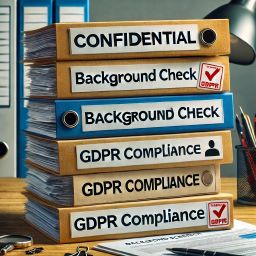

Positions requiring airside access or known consignor status follow dedicated vetting procedures.
Organizations can get multiple ECRCs for candidates with different European address histories through a central application process.
Employment vetting can be done for positions outside of Ireland through services like the European Criminal Record Check (ECRC), which covers 26 EU states.
Consumer Credit Verification Process
The application processing combines various European criminal checks into one complete report.
2.Documentation storage follows specific guidelines, with automatic deletion protocols implemented after legally required retention periods.
How Do Candidates Dispute Errors in Their PSA Background Report?
In Ireland's security and employment sectors, several specific types of background checks are required by the Private Security Authority (PSA).
3.Proof of ID
Reference Checks by Sector
The process completes background verification while following different jurisdictions' data protection regulations and legal requirements.
The implementation of PSA Standards has changed operational protocols across various sectors, especially in industries where security and trust matter most. These standards set high requirements for security job roles, affecting many business operations.
International qualification verifications typically take more time to complete.


Under Irish and European data protection regulations, pre-employment vetting services must maintain compliance measures to protect candidate information.
The Scope of Irish Employment Vetting
After completing the review, the agency produces a detailed report and sends it to the employer.
This approach allows Irish organizations to participate in cross-border tenders while maintaining consistent vetting standards across European operations.
Best Practices in Pre-Employment Screening
Role of Technology in Enhancing Background Verification Working through pre-employment screening under data protection laws, companies use technology to improve the efficiency of background verifications. Automated systems speed up employee background checks, reducing completion times through online checks for education, employment history, and criminal records.

The centralized application process simplifies vetting, providing employers with criminal history information in a single, organized report.
This method allows quick handling of various checks, including consumer credit reports, bankruptcy searches, and directorship histories.
Businesses need to evaluate background check services before selecting a provider.

A background check in Ireland involves reviewing a person's criminal, financial, or personal records to assess their suitability for a role or position.
The duration can vary but typically takes between 1-2 weeks, depending on the type and complexity of the check.
Garda vetting is a specific type of background check required in Ireland for individuals working with children or vulnerable adults, involving checks against police records.
Yes, you must obtain consent from the individual before conducting any background checks in Ireland.
Not for all employees, but certain sectors such as healthcare and education may require comprehensive checks.
It includes checking for any criminal convictions or offences recorded against the individual.
Yes, individuals can request their own background checks in Ireland for personal review or to prepare for employment screenings.
Skipping background checks can lead to hiring unsuitable candidates, which may result in legal and reputational risks.
Yes, police clearance is a general criminal record check, while Garda vetting is specific to roles involving vulnerable groups and includes more detailed investigations.
You can request transcripts or degrees directly from educational institutions or use third-party services that specialize in educational verifications.
Information about spent convictions, certain types of personal data, and other protected characteristics under GDPR is off-limits unless specifically relevant and lawful to access.
International checks may involve additional complexities such as different laws, languages, and longer processing times.
No, background checks do not affect your credit score as they do not involve a credit inquiry that would impact the score.
Best practices include securing data in compliance with GDPR, limiting access to authorized personnel, and ensuring data is stored for only as long as necessary.
It depends on the industry and role, but typically every 2-3 years or when significant changes occur in the individual’s role or responsibility.
While not specific by law, many IT positions require checks due to access to sensitive or proprietary information.
GDPR regulates the processing of personal data, ensuring that background checks are conducted in a lawful, fair, and transparent manner.
Yes, but it must be done lawfully and with the individual’s consent, considering the relevance to the role.
Penalties can include fines, legal actions, and reputational damage, depending on the severity of the non-compliance.
Remote work has increased the importance of thorough background checks, especially for those in positions of trust or handling sensitive data.
Best practices include conducting similar checks as for permanent staff, especially if they have access to sensitive or critical areas.
Ensuring fairness involves following consistent procedures, obtaining consent, and allowing candidates to dispute inaccuracies.
Yes, it’s recommended to tailor background checks based on the specific risks and requirements of each position.
Signs include transparency about services, compliance with legal standards, positive reviews, and strong data protection practices.
Handling involves assessing the relevance to the job, discussing findings with the candidate, and considering legal and ethical implications.